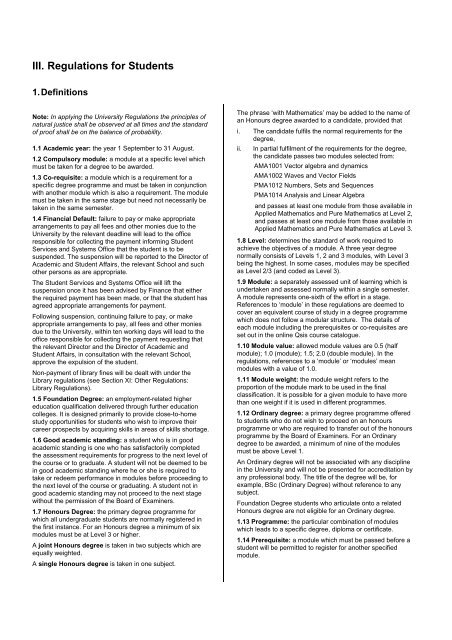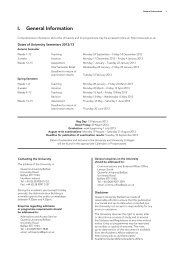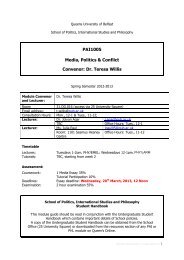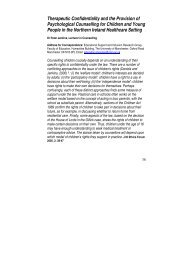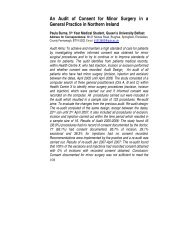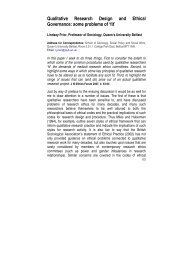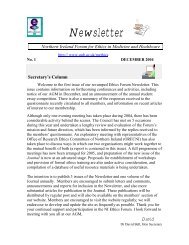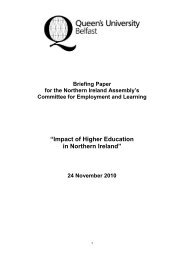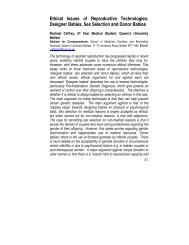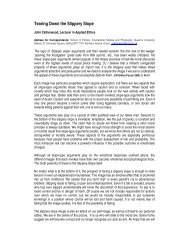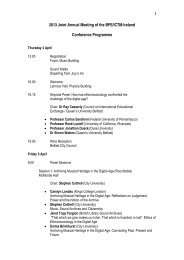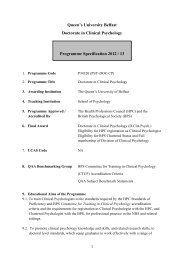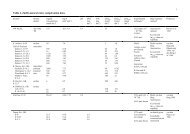University Calendar for Postgraduate Students 2012/13 - Queen's ...
University Calendar for Postgraduate Students 2012/13 - Queen's ...
University Calendar for Postgraduate Students 2012/13 - Queen's ...
You also want an ePaper? Increase the reach of your titles
YUMPU automatically turns print PDFs into web optimized ePapers that Google loves.
III. Regulations <strong>for</strong> <strong>Students</strong><br />
1. Definitions<br />
Note: In applying the <strong>University</strong> Regulations the principles of<br />
natural justice shall be observed at all times and the standard<br />
of proof shall be on the balance of probability.<br />
1.1 Academic year: the year 1 September to 31 August.<br />
1.2 Compulsory module: a module at a specific level which<br />
must be taken <strong>for</strong> a degree to be awarded.<br />
1.3 Co-requisite: a module which is a requirement <strong>for</strong> a<br />
specific degree programme and must be taken in conjunction<br />
with another module which is also a requirement. The module<br />
must be taken in the same stage but need not necessarily be<br />
taken in the same semester.<br />
1.4 Financial Default: failure to pay or make appropriate<br />
arrangements to pay all fees and other monies due to the<br />
<strong>University</strong> by the relevant deadline will lead to the office<br />
responsible <strong>for</strong> collecting the payment in<strong>for</strong>ming Student<br />
Services and Systems Office that the student is to be<br />
suspended. The suspension will be reported to the Director of<br />
Academic and Student Affairs, the relevant School and such<br />
other persons as are appropriate.<br />
The Student Services and Systems Office will lift the<br />
suspension once it has been advised by Finance that either<br />
the required payment has been made, or that the student has<br />
agreed appropriate arrangements <strong>for</strong> payment.<br />
Following suspension, continuing failure to pay, or make<br />
appropriate arrangements to pay, all fees and other monies<br />
due to the <strong>University</strong>, within ten working days will lead to the<br />
office responsible <strong>for</strong> collecting the payment requesting that<br />
the relevant Director and the Director of Academic and<br />
Student Affairs, in consultation with the relevant School,<br />
approve the expulsion of the student.<br />
Non-payment of library fines will be dealt with under the<br />
Library regulations (see Section XI: Other Regulations:<br />
Library Regulations).<br />
1.5 Foundation Degree: an employment-related higher<br />
education qualification delivered through further education<br />
colleges. It is designed primarily to provide close-to-home<br />
study opportunities <strong>for</strong> students who wish to improve their<br />
career prospects by acquiring skills in areas of skills shortage.<br />
1.6 Good academic standing: a student who is in good<br />
academic standing is one who has satisfactorily completed<br />
the assessment requirements <strong>for</strong> progress to the next level of<br />
the course or to graduate. A student will not be deemed to be<br />
in good academic standing where he or she is required to<br />
take or redeem per<strong>for</strong>mance in modules be<strong>for</strong>e proceeding to<br />
the next level of the course or graduating. A student not in<br />
good academic standing may not proceed to the next stage<br />
without the permission of the Board of Examiners.<br />
1.7 Honours Degree: the primary degree programme <strong>for</strong><br />
which all undergraduate students are normally registered in<br />
the first instance. For an Honours degree a minimum of six<br />
modules must be at Level 3 or higher.<br />
A joint Honours degree is taken in two subjects which are<br />
equally weighted.<br />
A single Honours degree is taken in one subject.<br />
The phrase ‘with Mathematics’ may be added to the name of<br />
an Honours degree awarded to a candidate, provided that<br />
i. The candidate fulfils the normal requirements <strong>for</strong> the<br />
degree,<br />
ii. In partial fulfilment of the requirements <strong>for</strong> the degree,<br />
the candidate passes two modules selected from:<br />
AMA1001 Vector algebra and dynamics<br />
AMA1002 Waves and Vector Fields<br />
PMA1012 Numbers, Sets and Sequences<br />
PMA1014 Analysis and Linear Algebra<br />
and passes at least one module from those available in<br />
Applied Mathematics and Pure Mathematics at Level 2,<br />
and passes at least one module from those available in<br />
Applied Mathematics and Pure Mathematics at Level 3.<br />
1.8 Level: determines the standard of work required to<br />
achieve the objectives of a module. A three year degree<br />
normally consists of Levels 1, 2 and 3 modules, with Level 3<br />
being the highest. In some cases, modules may be specified<br />
as Level 2/3 (and coded as Level 3).<br />
1.9 Module: a separately assessed unit of learning which is<br />
undertaken and assessed normally within a single semester.<br />
A module represents one-sixth of the ef<strong>for</strong>t in a stage.<br />
References to ‘module’ in these regulations are deemed to<br />
cover an equivalent course of study in a degree programme<br />
which does not follow a modular structure. The details of<br />
each module including the prerequisites or co-requisites are<br />
set out in the online Qsis course catalogue.<br />
1.10 Module value: allowed module values are 0.5 (half<br />
module); 1.0 (module); 1.5; 2.0 (double module). In the<br />
regulations, references to a ‘module’ or ‘modules’ mean<br />
modules with a value of 1.0.<br />
1.11 Module weight: the module weight refers to the<br />
proportion of the module mark to be used in the final<br />
classification. It is possible <strong>for</strong> a given module to have more<br />
than one weight if it is used in different programmes.<br />
1.12 Ordinary degree: a primary degree programme offered<br />
to students who do not wish to proceed on an honours<br />
programme or who are required to transfer out of the honours<br />
programme by the Board of Examiners. For an Ordinary<br />
degree to be awarded, a minimum of nine of the modules<br />
must be above Level 1.<br />
An Ordinary degree will not be associated with any discipline<br />
in the <strong>University</strong> and will not be presented <strong>for</strong> accreditation by<br />
any professional body. The title of the degree will be, <strong>for</strong><br />
example, BSc (Ordinary Degree) without reference to any<br />
subject.<br />
Foundation Degree students who articulate onto a related<br />
Honours degree are not eligible <strong>for</strong> an Ordinary degree.<br />
1.<strong>13</strong> Programme: the particular combination of modules<br />
which leads to a specific degree, diploma or certificate.<br />
1.14 Prerequisite: a module which must be passed be<strong>for</strong>e a<br />
student will be permitted to register <strong>for</strong> another specified<br />
module.


